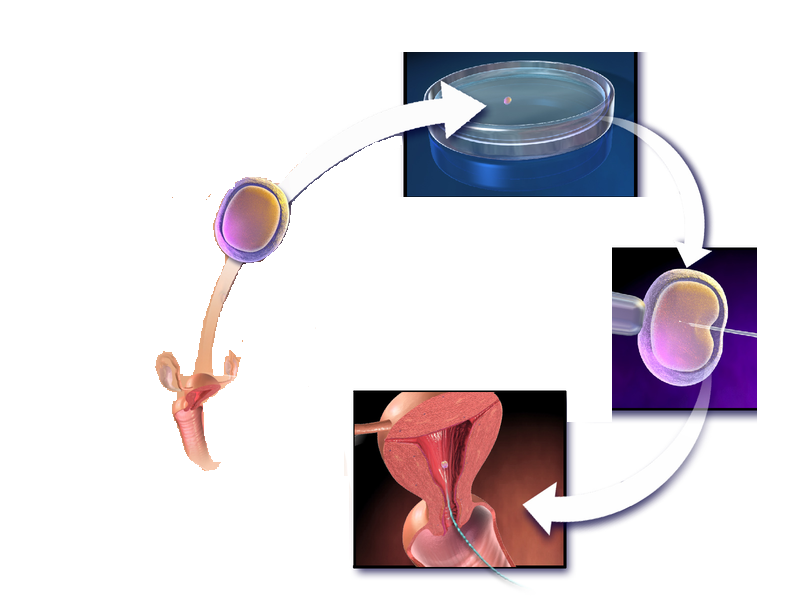What does IVF stand for?
IVF stands for in-vitro-fertilization which is a type of assisted reproductive technology (ART) where male Sperms and Female Eggs are fertilized out of the body using a test tube in an assisted environment(medical lab). IVF involves complex clinical processes involving both medical and surgical intervention is conducted under medical supervision. It is recommended for couples who unable to conceive normally. IVF also suggested preventing genetic transmission of disease in case either of the partners has a genetic disorder.
Brief description of IVF
IVF is one of the most common ART. It can be done by using commencing parents’ eggs and sperm for fertilization in a laboratory set-up. It is also possible in IVF to use a donor egg or donor sperm to create an embryo. Even, in gestational surrogacy, IVF is a vital step for a successful outcome.
In gestational surrogacy, a woman carries the fetus instead of the intended mother due to physical inability because of impaired reproductive functioning. The embryo created through IVF is implanted into the mother or surrogate womb for further development.
IVF uses the following steps to create an embryo in a specialized clinical setup under the supervision of IVF specialists:
- Hormonal therapy to stimulate ovulation and maturation of eggs
- Retrieval of a mature egg from the female ovary
- Collection of viable, good quality sperm
- Artificial fertilization of egg and sperm
- Monitoring of the embryo development
- Implantation of the viable and good quality embryo
- After a certain period of conduction of pregnancy check
Usually, the duration of one complete IVF cycle requires three weeks. But this is not fixed for every case. Depending upon each case history, the whole process may need to divide into different stages and takes a longer period.
The success of IVF depends upon maternal age and the cause of infertility. In certain cases, IVF may time consuming and the expense is more than the normal estimated budget. Depending upon the treatment plan doctor can implant multiple embryos instead of single embryo implantation, which results in multiple pregnancies.
When IVF recommended?
- Blockage and damage of the Fallopian tube is the condition that creates an obstacle in egg movement that requires fertilization or unable embryo to travel to the uterus.
- Absence or infrequent ovulation disorders lead to the unavailability of eggs or insufficient eggs for fertilization.
- The outer projection of uterine tissue, which is termed endometriosis affects the ovarian, uterine, and fallopian tube functioning.
- Fibroid formation in the uterine wall is a type of benign tumor, which interferes with the implantation of the fertilized egg. It usually occurs in females at the age of 30 years to 40 years.
- Medical history of tubal ligation, which is occurred due to cut or permanent blocking of fallopian tubes. IVF is an alternative to reverse tubal ligation.
- Impaired sperm production and functioning cause insufficient sperm or abnormal sperm morphology, which unable to fertilize an egg. Impaired sperm production and functioning may require additional treatment depending upon the underlying cause of the impairment.
- IVF is also a solution to unexplained infertility.
- Either of the parents acts as a carrier of a genetic disorder, then pre-implantation genetic testing is conducted, which is a part of the IVF process to screen created embryos that do not have the identified problems that can be transferred to the uterus.
- Freezing of eggs is the option for fertility preservation. Cancer-affected females can opt for this method before perusing radiation or chemotherapy, which may damage reproductive functioning. The IVF treatment is recommended in such cases also to obtain a successful pregnancy outcome in the future.
Read Also: IVF the only option for pregnancy
Read Also: IVF success rate
Read Also: What does IVF stand for?

Ravi Sharma is a self-motivated, successful entrepreneur and has a solid experience in the fertility segment. and he is the director at ARTbaby Global (ARThealthcare). He is a pharmacy graduate with post-graduation in business administration and has 14 years of rich experience in the field of infertility segment. He loves to write about IVF, Surrogacy, and other ART (assisted reproductive technology) news, issues, and updates. He is a Pharmacy graduate (B. Pharm) and M.B.A (marketing).
His most recent success includes the successful launch of the medical tourism company, ARTbaby, which offers treatment options for infertility, egg donation, and surrogacy. He likes spending time with his family and writing about various aspects of IVF surrogacy and donating eggs.

